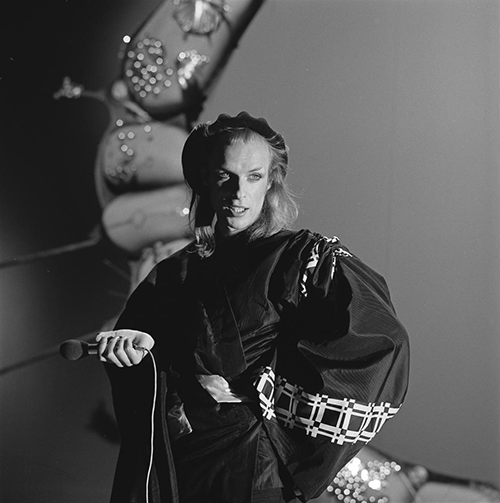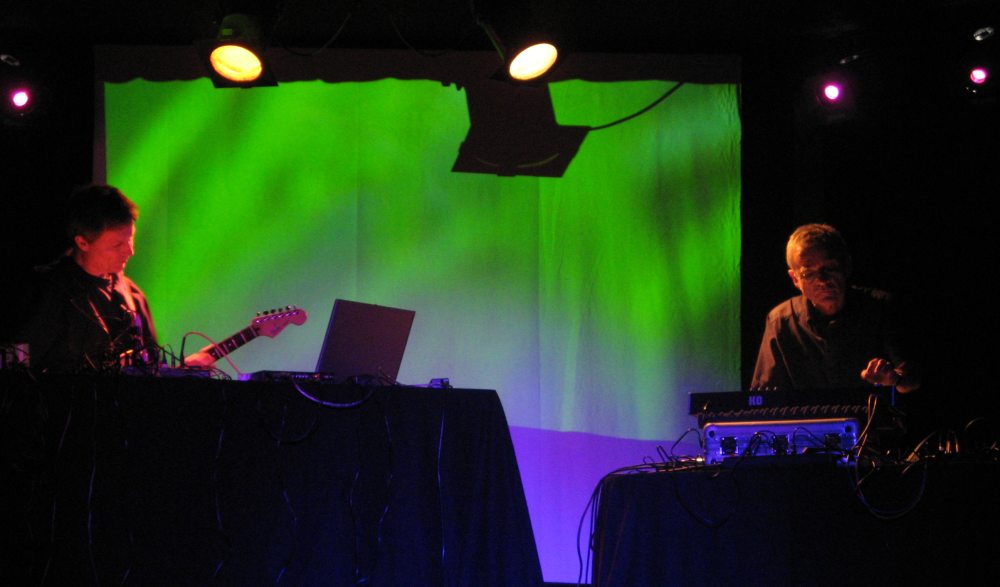|
Flammende Herzen
''Flammende Herzen'' (German for “Flaming Hearts”) is the debut studio album by the German solo artist Michael Rother. It was released in 1977 and includes the single "Flammende Herzen" b/w "Karussell". The music was used the following year to soundtrack ''Flaming Hearts''. It was Rother's first solo venture after having recorded five albums prior as a member of Neu! with Klaus Dinger and Harmonia with Hans-Joachim Roedelius and Dieter Moebius. The album was recorded between June and September 1976 in Germany at Conny's Studio. Receiving positive reviews the album was released as an LP in March 1977 before it was re-released by Polydor in 1982. The album was reissued on CD in 1990, before being re-issued again in 1993 with bonus tracks and having been remastered. The artwork for the album was designed by Rike with photography by Christian Rabe and Ann. Recording and music Following the disbandment of Neu! having released their third studio album ''Neu! '75'' in 1975, Rother ... [...More Info...] [...Related Items...] OR: [Wikipedia] [Google] [Baidu] |
Michael Rother
Michael Rother (; born 2 September 1950) is a German experimental musician, best known for being a founding member of the influential bands Neu! and Harmonia (band), Harmonia, and an early member of the band Kraftwerk. Early life and education Born in 1950, Rother was educated in Munich, Wilmslow (England), Karachi, and Düsseldorf. He also resided in Pakistan in the early 1960s where he was exposed to Pakistani music that would influence his own music in the late 1960s and early 1970s. From 1965 Rother played in the band Spirits of Sound, from which other members would later go on to join Kraftwerk (Wolfgang Flür) and Wunderbar. Music career Rother is a multi-instrumentalist (primarily guitar and keyboards) who, along with a catalog of several solo albums starting in 1977, is best known for having co-founded the German group Neu! with drummer Klaus Dinger (five albums between 1971 and 1996), and his collaborative efforts with Hans-Joachim Roedelius and Dieter Moebius ... [...More Info...] [...Related Items...] OR: [Wikipedia] [Google] [Baidu] |
LP Album
The LP (from long playing or long play) is an analog sound storage medium, specifically a phonograph record format characterized by: a speed of rpm; a 12- or 10-inch (30- or 25-cm) diameter; use of the "microgroove" groove specification; and a vinyl (a copolymer of vinyl chloride acetate) composition disk. Introduced by Columbia Records in 1948, it was soon adopted as a new standard by the entire US record industry and, apart from a few relatively minor refinements and the important later addition of stereophonic sound in 1957, it remained the standard format for record albums during a period in popular music known as the album era. LP was originally a trademark of Columbia and competed against the smaller 7-inch sized "45" or "single" format by RCA Victor, eventually ending up on top. Today in the vinyl revival era, a large majority of records are based on the LP format and hence the LP name continues to be in use today to refer to new records. Format advantages At ... [...More Info...] [...Related Items...] OR: [Wikipedia] [Google] [Baidu] |
1977 Debut Albums
Events January * January 8 – 1977 Moscow bombings, Three bombs explode in Moscow within 37 minutes, killing seven. The bombings are attributed to an Armenian separatist group. * January 10 – Mount Nyiragongo erupts in eastern Zaire (now the Democratic Republic of the Congo). * January 17 – 49 marines from the and are killed as a result of a collision in Barcelona harbour, Spain. * January 18 ** Scientists identify a previously unknown Bacteria, bacterium as the cause of the mysterious Legionnaires' disease. ** Australia's worst Granville rail disaster, railway disaster at Granville, a suburb of Sydney, leaves 83 people dead. ** SFR Yugoslavia Prime minister Džemal Bijedić, his wife and 6 others are killed in a plane crash in Bosnia and Herzegovina. * January 19 – An Ejército del Aire CASA C-207 Azor, CASA C-207C Azor (registration T.7-15) plane crashes into the side of a mountain near Chiva, Valencia, Chiva, on approach to Valencia Airport in Spain, killing all ... [...More Info...] [...Related Items...] OR: [Wikipedia] [Google] [Baidu] |
Allmusic
AllMusic (previously known as All-Music Guide and AMG) is an American online database, online music database. It catalogs more than three million album entries and 30 million tracks, as well as information on Musical artist, musicians and Musical ensemble, bands. Initiated in 1991, the database was first made available on the Internet in 1994. AllMusic is owned by RhythmOne. History AllMusic was launched as ''All-Music Guide'' by Michael Erlewine, a "compulsive archivist, noted astrologer, Buddhist scholar, and musician". He became interested in using computers for his astrological work in the mid-1970s and founded a software company, Matrix, in 1977. In the early 1990s, as compact discs (CDs) replaced LP record, LPs and cassette (format), cassettes as the dominant format for recorded music, Erlewine purchased what he thought was a CD of early recordings by Little Richard. After buying it, he discovered it was a "flaccid latter-day rehash". Frustrated with the labeling, he res ... [...More Info...] [...Related Items...] OR: [Wikipedia] [Google] [Baidu] |
Tracks And Traces
''Tracks and Traces'' is a collaborative album by German kosmische supergroup Harmonia (featuring Neu! guitarist Michael Rother and Cluster members Hans-Joachim Roedelius and Dieter Moebius) and British musician Brian Eno, initially credited to Harmonia 76. Eno joined the group at Harmonia's studio in Forst, Germany for the September 1976 recording sessions. The results remained unreleased until November 1997, when they were compiled by the American Rykodisc label (originally in Germany by the label ''S3'', remastered by Eric Spitzer-Marlyn and Othmar Eichinger). In 2009, a reissue featuring additional tracks and alternative artwork was released, this time credited to Harmonia & Eno '76. Background and releases Upon hearing Harmonia in the early 1970s, Eno proclaimed them "the most important band in the world." He eventually joined Harmonia on stage in 1974 at The Fabrik in Hamburg, and promised to join them at their Forst recording studio to record with them. After Harmonia h ... [...More Info...] [...Related Items...] OR: [Wikipedia] [Google] [Baidu] |
Brian Eno
Brian Peter George Jean-Baptiste de la Salle Eno (, born 15 May 1948), also mononymously known as Eno, is an English musician, songwriter, record producer, visual artist, and activist. He is best known for his pioneering contributions to ambient music and electronica, and for producing, recording, and writing works in rock music, rock and pop music. A self-described "non-musician", Eno has helped introduce unconventional concepts and approaches to contemporary music. He has been described as one of popular music's most influential and innovative figures. In 2019, he was inducted into the Rock and Roll Hall of Fame as a member of Roxy Music. Born in Suffolk, Eno studied painting and experimental music at the art school of Ipswich Civic College in the mid-1960s, and then at Winchester School of Art. He joined the glam rock group Roxy Music as its synthesiser player in 1971 and recorded two albums with them before departing in 1973. He then released solo albums, beginning with ''He ... [...More Info...] [...Related Items...] OR: [Wikipedia] [Google] [Baidu] |
Roxy Music
Roxy Music are an English rock music, rock band formed in 1970 by Bryan Ferry (lead vocals/keyboards/principal songwriter) and Graham Simpson (musician), Graham Simpson (bass). By the time the band recorded their Roxy Music (album), first album in 1972, Ferry and Simpson were joined by Andy Mackay (saxophone/oboe), Phil Manzanera (guitar), Paul Thompson (musician), Paul Thompson (drums) and Brian Eno (synthesizer). Other members during the band's history include Eddie Jobson (synthesizer/keyboards/violin) and John Gustafson (musician), John Gustafson (bass). Beginning with their first album, Roxy Music became a successful act in Europe and Australia during the 1970s. The band pioneered more musically sophisticated elements of glam rock, significantly influencing early English punk rock, punk music, and provided a model for many New wave music, new wave acts while innovating elements of electronic music, electronic composition. The group also conveyed their distinctive brand of ... [...More Info...] [...Related Items...] OR: [Wikipedia] [Google] [Baidu] |
Cluster (band)
Cluster was a German musical duo consisting of Hans-Joachim Roedelius and Dieter Moebius, formed in 1971 and associated with West Germany's krautrock and kosmische music scenes.Bush, John. Allmusic: Cluster Retrieved 24 February 2005. Originating from the earlier Berlin-based group Kluster, the duo relocated in 1971 to the countryside village of Forst, Lower Saxony, where they built a studio and collaborated with musicians such as Conny Plank, Brian Eno, and Michael Rother. With Rother, they formed the influential side project Harmonia. Cluster disbanded in 1981 but reunited twice, from 1989 to 1997 and again from 2007 to 2010. AllMusic described Cluster as "the most important and consistently underrated space rock unit of the '70s." Music historian Julian Cope included three Cluster albums—'' Cluster II'' (1972), '' Zuckerzeit'' (1974), and '' Sowiesoso'' (1976)—in his ''Krautrock Top 50''. ''The Wire'' included their debut album in its list of "One Hundred Records T ... [...More Info...] [...Related Items...] OR: [Wikipedia] [Google] [Baidu] |
Can (band)
Can (stylized in all caps) were a German experimental rock band formed in Cologne in 1968 by Holger Czukay (bass, tape editing), Irmin Schmidt (keyboards), Michael Karoli (guitar), and Jaki Liebezeit (drums). They featured several vocalists, including American Malcolm Mooney (1968–70) and Japanese Damo Suzuki (1970–73). They have been hailed as pioneers of the German krautrock scene. The founding members of Can came from backgrounds in avant-garde music and jazz. They blended elements of psychedelic rock, funk, and musique concrète on influential albums such as ''Tago Mago'' (1971), ''Ege Bamyasi'' (1972) and ''Future Days (album), Future Days'' (1973). Can also had commercial success with singles such as "Spoon (Can song), Spoon" (1971) and "I Want More (Can song), I Want More" (1976) reaching national single (music), singles charts. Their work has influenced rock, post-punk, and ambient music, ambient acts. History 1960s Can was formed in Cologne, Germany, in 1968 by H ... [...More Info...] [...Related Items...] OR: [Wikipedia] [Google] [Baidu] |
Jaki Liebezeit
Jaki Liebezeit (born Hans Liebezeit; 26 May 1938 – 22 January 2017) was a German drummer, best known as a founding member of experimental rock band Can. He was called "one of the few drummers to convincingly meld the funky and the cerebral". Biography Early life Hans Liebezeit was born in the village of Ostrau south of Dresden, Germany. His mother, Elisabeth, was from Lower Saxony. His father, Karl Moritz Johannes Liebezeit, was the music teacher at the village school, specialising in accordion and violin, and taught both instruments to Hans, who treasured his father's accordion for the rest of his life. His father was forced to stop teaching music during the Nazi period, and died in mysterious circumstances on 18 August 1943. Hans' early life was one of extreme poverty, with no running water at home, surviving on vegetables grown in the garden, and having to walk several kilometres to school daily. As the Soviets began to occupy East Germany, he became a refugee when his mot ... [...More Info...] [...Related Items...] OR: [Wikipedia] [Google] [Baidu] |
Neu! '75
''Neu! 75'' is the third studio album by German krautrock band Neu!, released in February 1975 on Brain Records. It was recorded and mixed at Conny Plank's studio between December 1974 and January 1975. The album was officially reissued on CD on 29 May 2001 by Astralwerks in the US and Grönland in the UK. Overview This album saw Neu! regroup after a few years' hiatus, during which time Michael Rother had worked with Cluster as the supergroup Harmonia. By this time, Rother and bandmate Klaus Dinger had somewhat diverged in their musical intentions for the band, with Dinger preferring a more aggressive, rock-influenced style than Rother's ambient predilections; the two compromised, and the resulting album showcases both sounds. Side one of the record, which reflects Rother's preferences, was recorded as a duo. On side two, Dinger switched from drums to guitar and lead vocals, with his brother Thomas and Hans Lampe double drumming. On both sides, the use of keyboards and phasing ... [...More Info...] [...Related Items...] OR: [Wikipedia] [Google] [Baidu] |
Dieter Moebius
Dieter Moebius (16 January 1944 – 20 July 2015) was a Swiss-born German electronic musician and composer, best known as a member of the influential krautrock bands Cluster and Harmonia. Career Moebius was studying art at Berlin's Akademie Grafik and working as a restaurant cook when he met Conrad Schnitzler, founder of the Zodiak Free Arts Lab with Hans-Joachim Roedelius. The trio founded the improv group Kluster in 1969. After the departure of Schnitzler, the duo changed their name to Cluster and relocated to the countryside village of Forst, releasing influential albums such as '' Zuckerzeit'' (1974) and '' Sowiesoso'' (1976). Moebius would also draw on his graphic design training create the cover artwork for various Cluster albums and related collaborations. Meanwhile, Moebius and Roedelius founded the band Harmonia with Michael Rother of Neu!, releasing the albums '' Musik von Harmonia'' (1974) and '' Deluxe'' (1975). Admirer Brian Eno would subsequently collaborate ... [...More Info...] [...Related Items...] OR: [Wikipedia] [Google] [Baidu] |



